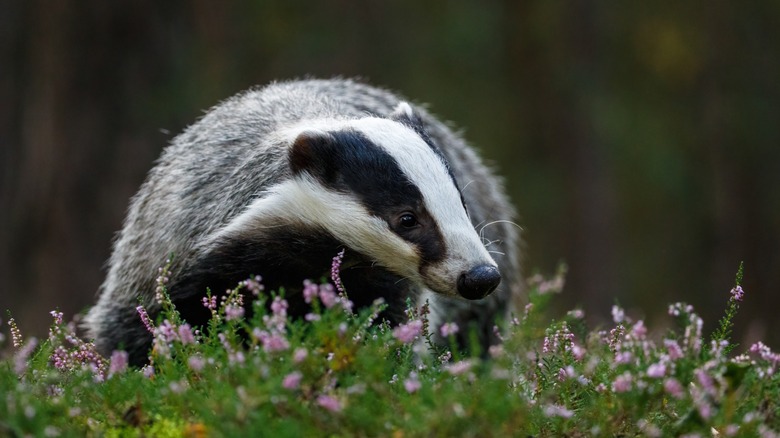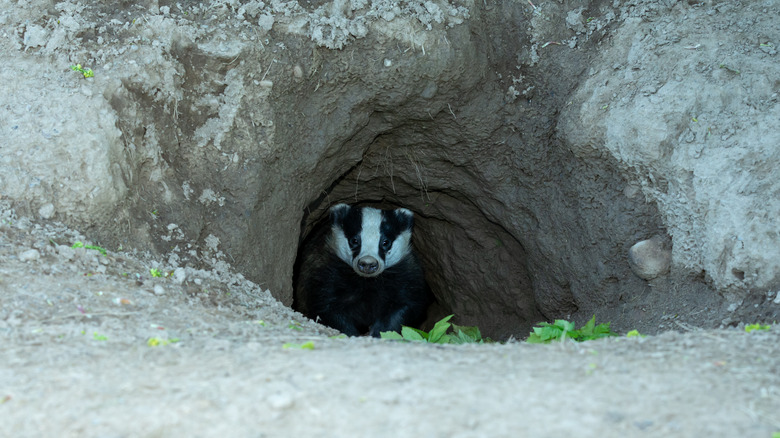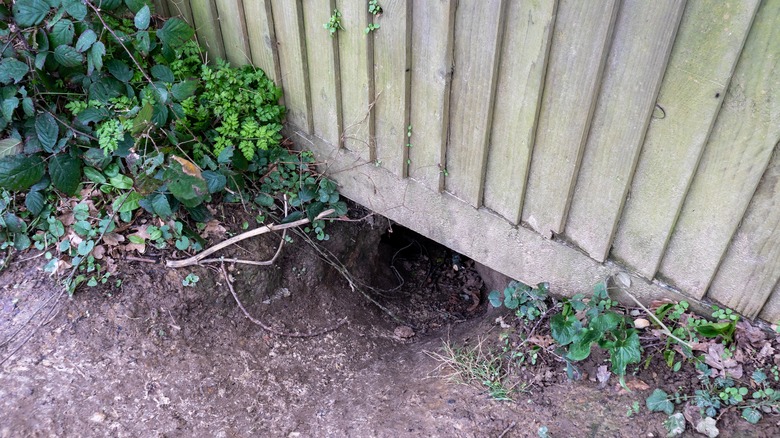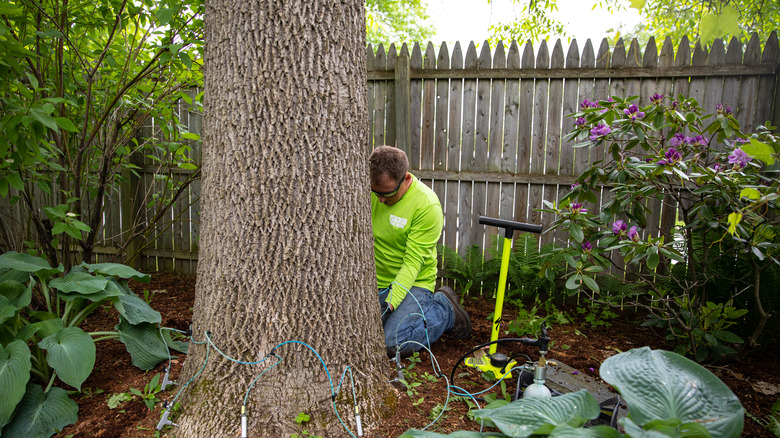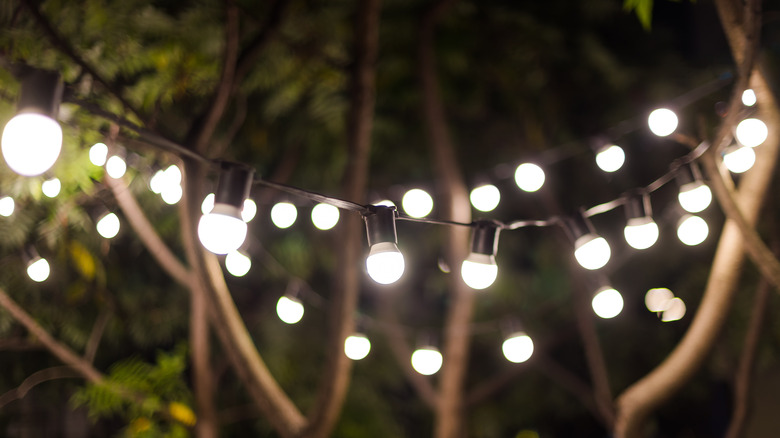8 Best Ways To Get Rid Of Badgers In Your Garden
If you're researching the best ways to get rid of badgers in your garden, you're in the right place. These nocturnal creatures are notorious for their digging capabilities, creating holes that are 2 to 9 feet deep and 1 to 2 feet wide. These holes, called badger setts, can pose a danger to all who live on the property, including pets, children, and adults. Of course, the risk of tripping and falling is paramount, but these holes can also wreak havoc on lawnmowers and other maintenance equipment when you're working in the yard.
Before you go to extremes in an attempt to rid your property of these pesky creatures, it's important to note that in some U.S. states, badgers are protected by law. This makes it illegal to hunt or trap them even though they're not considered endangered. Keep in mind, too, that a trapped badger is a ferocious and dangerous wild animal. If this is the avenue you choose because it is legal where you live, be sure to contact trained professionals for help. There are lots of ways to deter badgers safely and humanely, though, or to at least keep certain areas free from their destructive habits.
Signs of badgers in your yard or garden
How do you know that badgers are responsible for the destruction of your yard or garden, and not some other pest? Well, a few things make it apparent: badger holes, droppings in shallow pits, and the remnants of their prey. The best way to differentiate the holes present is by size. Small holes that are only a few inches in diameter are more likely to be the homes of chipmunks and voles, or maybe foxes and skunks. Badgers, like coyotes and woodchucks, like their holes much bigger. The location offers another clue. If you have a water feature in your yard like a backyard pond and it's surrounded by burrow holes, those probably house muskrats or minks.
Badgers have a reputation as vicious and messy eaters. When they devour animals for dinner, they leave behind bits of fur, bones, and even entire spines and heads. Not exactly something you want to go looking for, but if you come across these remnants, you can likely bet it was a badger.
The damage that badgers can do
Badgers can inflict an impressive amount of damage on a property. Part of this is because of the enormous size of their setts. It's also because of the underground tunnel systems they create, which can be serious enough to undermine building foundations. This can be problematic if they dig below sheds and patios as well.
Other signs of an infestation include a ravaged lawn or garden and seeing your vegetable and flower beds destroyed. Their large claws will rip through your lawn leaving behind patches of dead grass. This happens because the badgers are searching for food in the form of insects, larvae, worms, and occasionally produce or plant bulbs. Aside from maligning your plants, badgers will dig under fencing to prey on your chickens; they've even been known to take down small lambs. Furthermore, their excessive burrowing can ruin carefully placed irrigation lines. To control the badger problem on your property, take the following steps to stop the digging and protect your garden.
1. Construct a wire mesh fence
This is the most traditional way of deterring badgers from entering your property. Also, if you're unsure of where to begin, Doityourself can walk you through the process from beginning to end. Start by digging holes that are 6 inches wide and 12 to 18 inches deep. Since badgers are fossorial animals, you'll want your fence to run underground to prevent them from digging underneath. First, install your metal or wood post stakes and section your mesh. It's always a great idea to cut and work with smaller pieces of fencing material instead of an entire roll at a time. Nest, examine the mesh sections for evenness and make sure they're well-fastened to the stakes. If you're working with a wood post, use wood screws to secure various parts of the fence. Metal posts stakes, on the other hand, require drilling and knowledge of metalwork.
2. Purchase and install solar lights
One of the ways to get rid of badgers in your garden is to take inspiration from the laws of nature. In this case, it's the premise that predatory animals scare off their prey, and this is where this innovative system comes into play. To that end, Nite Guard Solar Lights are a solar-powered device that emit red flashing lights, resembling the watchful gaze of a large animal. Since badgers are small mammals, they will exit the area frightened, not wishing to be killed.
While simple, this is a smart way to protect your vegetable or flower garden. The manufacturer of this product, Nite Guard, says that their device features a sensor that activates the red light automatically at night and turns it off in the morning. For the best results, place your Nite Guard Solar Light in the darkest parts of your garden for an intense effect.
3. Spray male urine
While unorthodox, many homeowners, gardeners, and ranchers swear by this solution. The theory here is that though small, badgers are territorial animals who don't wish to share a space with any species. As Allotment & Gardens puts it, male urine carries an odor that most animals perceive as territorial dominance. Therefore, if human males establish authority by marking their territory with urine, the badgers will move away. It's a respect thing, of sorts.
To use this method, you must be willing to spray the boundaries of your garden with human male urine (in the most hygienic way possible, of course). Dilute it with water in a 1:4 ratio to control the smell, and use a watering can or sprayer to maintain discretion. This way, you wouldn't break any public urination laws or offend your neighbors. The effect fades away in five to seven days, so repeat once a week or immediately after it rains.
4. Keep your garden clean
One of the best ways to get rid of badgers in your garden is to keep a clean environment. This includes minimizing waste and eliminating potential food sources so they wouldn't have a reason to dig holes on your property. A good place to start is to keep a tight lid on your garbage cans, compost bins, and food recycling bins. Secure the lid with lockers or bungee cords to prevent access even when the bin topples over. If your pets eat outside, remember to remove their feeding bowls and clean the area.
Another excellent tip to deter badgers is to elevate and isolate the bird feeders in your garden. Badgers are particularly fond of nuts, fruits, fat balls, and bird seeds, and will come running to eat anything that falls to the ground. To combat this, try clearing the ground before nightfall, Sloane & Sons advise.
5. Use natural scents as repellents
Badgers may have poor eyesight, but they also possess an incredible sense of smell that's much more intense than humans, Badger Trust says. With such a strong sense of smell, you can employ the natural scents they detest to get rid of them. For the first method, sprinkle crushed scotch bonnet chili peppers around their setts or your garden boundary. They will find the smell irritating and turn away from your property. Keep your hands away from your face when working with peppers, they can be very hot!
The second method is to apply citronella oil, which badgers dislike, to the bottom of your fences and around entrances. You can also mix both ingredients to create a natural spray, which you will spray around your garden and on all entry and exit points. Note that the rain can wash everything away, so be sure to reapply.
6. Contact your local badger control specialist
Though badgers are nuisances, we believe it's cruel to destroy their setts while they're nesting or trap them inside. In some regions, they're a protected species so it's illegal to harm them — check your local laws for specifics. Doing so can lead to a hefty fine or jail stint, according to Flowerpotman.
This is why hiring a local pest control company to intervene can be one of the best ways to get rid of badgers in your garden. These experts will examine your garden and determine the best course of action. They also know how to relocate them safely to another area, fill their empty setts, and ensure that another badger clan doesn't take over your lawn or garden. You may find this option especially beneficial if you have a wild infestation problem that has resulted in economic losses, subsidence, and significant structural damage.
7. Get garden scarers
Since badgers don't like the presence of others in their territory, it's always a good idea to install scarers to keep them away. Opt for the solar-powered ones with glow-in-the-dark eyes, which will most certainly deter these unwanted creatures from tearing up your lawn and garden. There are various types on the market, including gnomes, cats, owls, and others in the shape of large animals. Pro tip: Switch their positions now and then to catch the badgers off guard.
If you can't purchase a scarer, leave a radio outside. It stimulates activity in your garden, explains Fantastic Services, which badgers aren't particularly fond of. Another excellent tip is to consider spreading lion dung (yes, you read that correctly) around if you are able to procure it. The scent of a stronger animal is powerful enough to make badgers flee your property. Ask your local zoo for this product or purchase it online or from your local home and garden center.
8. Install motion sensor lights
A motion sensor light will only activate when it senses movement. For this reason, installing a few can be one of the best ways to get rid of badgers in your garden, as noted by Garden Doctor. Since badgers are nervous animals, they would flee every time the lights turn on, deterring them from creating setts and establishing a foothold on your property.
Additionally, we recommend that you purchase rechargeable, low-cost LED lights to save money, as these lights will consume less energy than other kinds of bulbs. You can move them around to prevent recurring visitors from getting accustomed to their presence. Furthermore, be sure to position the beams well so as not to upset your neighbors. Pro tip: For a small to medium garden, two to three motion sensor lights can get the job done. For a larger space, you may need to install more lights.
